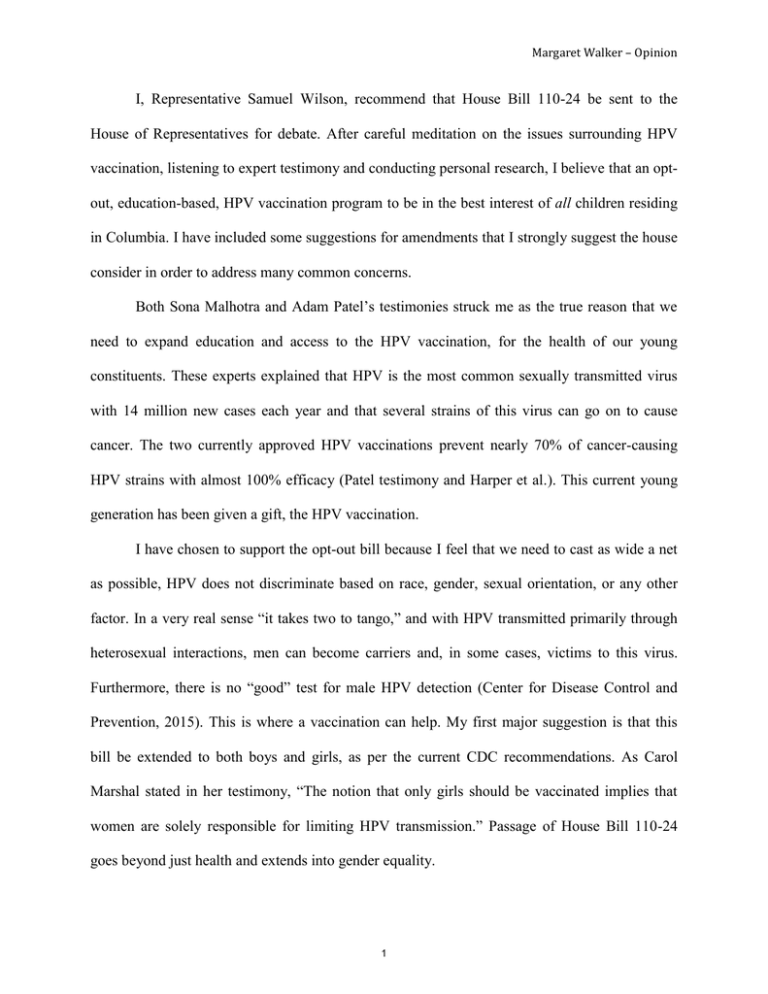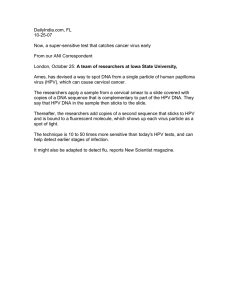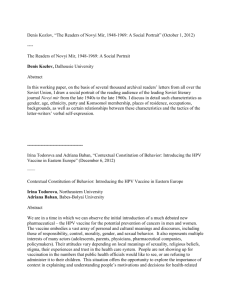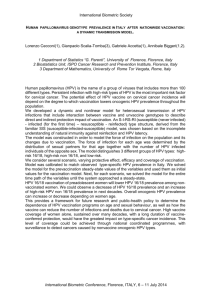I, Representative Samuel Wilson, recommend ... House of Representatives for debate. ...
advertisement

Margaret Walker – Opinion I, Representative Samuel Wilson, recommend that House Bill 110-24 be sent to the House of Representatives for debate. After careful meditation on the issues surrounding HPV vaccination, listening to expert testimony and conducting personal research, I believe that an optout, education-based, HPV vaccination program to be in the best interest of all children residing in Columbia. I have included some suggestions for amendments that I strongly suggest the house consider in order to address many common concerns. Both Sona Malhotra and Adam Patel’s testimonies struck me as the true reason that we need to expand education and access to the HPV vaccination, for the health of our young constituents. These experts explained that HPV is the most common sexually transmitted virus with 14 million new cases each year and that several strains of this virus can go on to cause cancer. The two currently approved HPV vaccinations prevent nearly 70% of cancer-causing HPV strains with almost 100% efficacy (Patel testimony and Harper et al.). This current young generation has been given a gift, the HPV vaccination. I have chosen to support the opt-out bill because I feel that we need to cast as wide a net as possible, HPV does not discriminate based on race, gender, sexual orientation, or any other factor. In a very real sense “it takes two to tango,” and with HPV transmitted primarily through heterosexual interactions, men can become carriers and, in some cases, victims to this virus. Furthermore, there is no “good” test for male HPV detection (Center for Disease Control and Prevention, 2015). This is where a vaccination can help. My first major suggestion is that this bill be extended to both boys and girls, as per the current CDC recommendations. As Carol Marshal stated in her testimony, “The notion that only girls should be vaccinated implies that women are solely responsible for limiting HPV transmission.” Passage of House Bill 110-24 goes beyond just health and extends into gender equality. 1 Margaret Walker – Opinion The reason that I have chosen to endorse 110-24 over 110-23 is that my goal is to protect Columbia’s children. By creating an opt-out system we can greatly improve coverage of the vaccine and drive down the cost of such a vaccination through school and governmental programs. Many of the concerns raised were on the price of the vaccination not the lack of desire for the vaccination as a limiting factor. A fact to keep in mind is that Merk’s patent on Gardasil will expire in October of 2015 and, shortly after, generic (biologically equivalent) options will become available (Joyce). With these generic drugs, typically an 80-85% decrease in price follows (US Food and Drug Administration, 2012). However, I understand that the financial burden is very real for many families. For this reason, among others, my second suggestion is to broaden the opt-out clause. Reasons such as economic and personal reservations should be considered valid reasons for opting out, and as a result, giving parents a larger role in the decision of whether or not to vaccinate their children. Finally, my last suggestion is to ingrain the spirit of bill 110-23 into House bill 110-24. Once again, I must reiterate that my goal is to improve public health, and I believe that this can, in part, be achieved by increased education on HPV and the HPV vaccination. Therefore, I suggest that all parents be given HPV vaccination information and highly encouraged to talk with their children about the vaccination. In order to eradicate many of the cancer-causing HPV strains, we must vaccinate as many of our children (boys and girls) as possible. I believe that we can best achieve this through the passage of House bill 110-24 with some added amendments. 2 Margaret Walker – Opinion REFERENCES Testimonies: Adam Patel- Columbia’s Commissioner of Health and Hygiene Written by Lucas Morales Sona Malhotra - Professor of immunology at John Adams University Written by Chimdimma Okwara Carol Marshall - Professor of gender studies at Alexander Hamilton University Written by Michelle Anand Outside: Harper, D. M., Franco, E. L., Wheeler, C. M., Moscicki, A. B., Romanowski, B., Roteli-Martins, C. M., ... & HPV Vaccine Study group. (2006). Sustained efficacy up to 4· 5 years of a bivalent L1 virus-like particle vaccine against human papillomavirus types 16 and 18: follow-up from a randomised control trial. The Lancet, 367(9518), 1247-1255. Center for Disease Control and Prevention. (2015). HPV and Men – Fact Sheet. Obtained from: http://www.cdc.gov/std/hpv/stdfact-hpv-and-men.htm. Center for Disease Control and Prevention. (2015). Genital HPV Infection – Fact Sheet. Obtained from: http://www.cdc.gov/std/hpv/stdfact-hpv.htm. Joyce, Joeseph G., Hugh A. George, Kathryn J. Hoffman, Kathrin U. Jansen, and Michael P. Neeper. Recombinant Human Papillomavirus Type 18 Vaccine. Patent US5820870 A. 13 Oct. 1998. Print. US Food and Drug Administration. (2012). Facts about Generic Drugs. Obtained from: http://www.fda.gov/Drugs/ResourcesForYou/Consumers/BuyingUsingMedicineSafely/U nderstandingGenericDrugs/ucm167991.htm 3 MIT OpenCourseWare http://ocw.mit.edu WGS.151 Gender, Health, and Society Spring 2016 For information about citing these materials or our Terms of Use, visit: http://ocw.mit.edu/terms.



